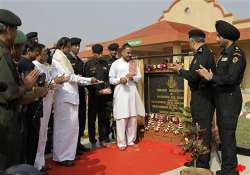Country's Security A Shared Responsibility, Says Chidambaram
Badu(WB)/Karnal(Har), Feb 18: Faced with strong opposition from non-Congress Chief Ministers over setting up of an anti-terror body, the Centre today reached out to them saying security of the country is a shared responsibility and

Badu(WB)/Karnal(Har), Feb 18: Faced with strong opposition from non-Congress Chief Ministers over setting up of an anti-terror body, the Centre today reached out to them saying security of the country is a shared responsibility and without coordination among states the war against terror cannot be won.
Inaugurating an NSG hub in Badu, about 50 kms from Kolkata, Home Minister P Chidambaram said the Constitution assigns law and order to the state government and also to the Centre to protect the country against external aggression or internal disturbance.
He said the founding fathers of the Constitution were also wise when they made article 355. “That is why they made national security, internal security a shared responsibility.”
“I have a responsibility to work with the states to quell terror, any militancy or rebellion,” he said at the function, which was skipped by West Bengal Chief Minister Mamata Banerjee, who has opposed the formation of NCTC.
In Karnal, Union Home Secretary R K Singh said the Centre has the duty to fight those who wage war against the nation and this war can't be won if states start working independently.
“It is the duty of the Central government to deal with terrorists and to coordinate with the states to tackle the terrorists. If all states work independently and if there is no coordination, can we win this fight ?,” he said.
Singh said the section that has been talked about, was part of that law (Unlawful Activities (Prevention) Act) since 2004.
“It is the Central government's responsibility to tackle someone who wages war against the nation. That is in the Union List (in the Constitution). We can't fight terrorism in this manner (with states opposing NCTC),” the Home Secretary said.
Banerjee has joined over half-a-dozen Chief Ministers of non-Congress-ruled states in opposing the Centre's plan to create a National Counter-Terrorism Centre (NCTC), claiming that it violated the federal provisions of the Constitution and was an attempt to usurp the states rights.
The others who protested included Naveen Patnaik (Odisha), J Jayalalitha (Tamil Nadu), Narendra Modi (Gujarat), Shivraj Singh Chauhan (Madhya Pradesh) and P K Dhumal (Himachal Pradesh).
Chidambaram did not refer to the controversy over the NCTC, nor did he make any comment on the Chief Ministers' opposition to it.
Making a point that the Centre did not discriminate between states on the basis of political parties that ruled governments there, he said the Centre worked with the previous government in West Bengal and “we are happy to work with the new government.”
He said the situation in Junglemahal created by the naxalites has been substantially controlled by the new government and the overall situation of the state has considerably improved.
“I want to compliment the West Bengal government that they have undertaken steps to considerably improve the situation. I am sure there will be greater improvement in the coming days,” he said.
“The government of India is happy to work with the state governments. We work with different political parties in troubled states like Odissa, Jharkhand, Chattisgarh and West Bengal and none of the states are ruled by the Congress”, Chidambaram said.
“Our approach to terrorism, naxalism and insurgency is the same irrespective of the government ruling the states.”